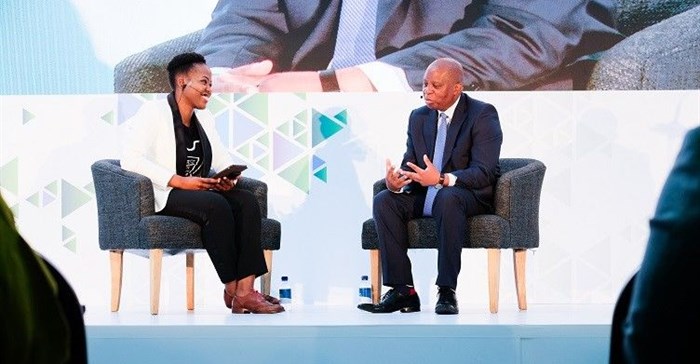
Related
Top stories




ESG & SustainabilityGovernment fossil fuel subsidies triple under Ramaphosa
Michael Cherry 42 minutes


More news
















Entrepreneur, founder of Black Like Me and current mayor of the city of Johannesburg, Herman Mashaba, shared the story of his entrepreneurial journey and the learnings he acquired. Key to his success, he said, was meeting a gap in the market and finding partners to contribute the skills he didn’t have.
He conceded that it’s difficult for small businesses to thrive in the current landscape and said government needs to create a more enabling environment for small businesses to thrive, including abolishing draconian labour laws. The prevalence of foreign nationals operating unregistered businesses in inner cities and townships, he added, threatened local small businesses and detrimentally impacted the economy as they paid no tax.
Small businesses need to harness technology to remain competitive, take their business to the next level, and disrupt larger and more established players, said Beauty Apleni, chief technology and information officer: consumer and small business at Telkom.
Technology, she reminded, has the ability to provide greater access to markets and resources. Companies like Netflorist, Superbalist and Yuppie Chef, all of which were born digital, have the advantage over those trying to implement a digital strategy further into their life cycle. She illustrated this using the example of Zando, currently the largest fashion retailer in SA, despite the fact that it has no physical stores and just 200 employees.
In the banking industry Capitec has successfully harnessed technology by investing in machine learning and AI to improve credit risk and enhance customer experience and as a result has disrupted its sector.
During a presentation on how corporates can catalyse growth in the SME sector, Nadia Oshry, senior manager: Moonshots at Standard Bank Group said when it comes to fintech and big companies, there are a couple of dynamics at play, primarily that they see each other as competitors, creating a potentially destructive relationship.
“Big companies have a conflict between employment and efficiency and are not geared to work with start-ups,” she pointed out. The solution, she said, was to create new business models which aligned the incentives of both the corporate and the start-up.
Standard Bank has partnered with Founders Factory to establish Founders Factory Africa which has a vision to scale 140 disruptive tech businesses over five years in Africa and enhance the start-up culture in key African cities.
Tax ombud CEO, advocate Hanyana Eric Mkhawane, shared insights on how to lodge a tax complaint. The office of the tax ombud was created to protect the rights of taxpayers and mediate disputes between taxpayers and Sars. He advised that businesses try to resolve issues directly with Sars but that if no resolution could be found, they should address the tax ombud – a free service – rather than embarking on costly litigation.
An essential component of scaling a business for growth, said business coach, Graham Mitchell, was to scale the leadership team in order to lessen its dependence on the founder.
While marketing and sales might be two halves of a whole, according to Nicholas Haralambous, entrepreneur, author and speaker, the most important element of any business is to have a good product. Only once you have a good product, backed by a business which provides a consistently good service, can you start to focus on building a brand.
During a discussion with Phumi Mashigo, founding MD of Ignitive, he said the biggest mistake entrepreneurs make is not understanding the difference between revenue and cashflow. Haralambous advised entrepreneurs to refine and learn their pitch deck and prioritise making sales. “The best way to raise money is to make sales. Without sales nobody is going to invest in your business,” he said.
Most SMEs don’t adequately manage their intellectual property (IP), said patent attorney, Vishen Pillay, a partner at Adams & Adams during a discussion on how businesses should consider IP an asset. He advised businesses to know their IP rights and to register their IP, trademarks, patents and designs. Keep new inventions confidential until they’ve been patented, he cautioned.
Gideon Tsatsi Bochedi, general manager claims and salvages of Credit Guarantee Insurance Corporation of Africa Limited (CGIC) said businesses should not to forget to consider the risk of human error, adding that strategy implementation failure is one of the biggest risks facing most businesses.
During a panel discussion between successful entrepreneurs – all of whom are chartered accountants by qualification – delegates heard how to formulate financial strategies to seize opportunities.
Lyle Malander, director of the Malander Group and winner of the top 35 under 35 in 2018, explained how his company had broken into the UK market. Finding the right partners when you move into a new territory, he said, is critical.
Okhela Ntsamai, a SAICA ED finance coach and business owner of Bonafide Group, said it’s very important for SMEs to have access to financial acumen, especially considering most of them are stretched from a resources perspective.
Khosi Tyobeka, founder and CEO of Zimasa Travel, a JP Morgan SMME, explained how the systems provided during the JP Morgan incubator programme provided her business with the ability to implement the right systems, which in turn allowed for the company to grow exponentially.
Louw Barnardt, owner of Outsourced CFO said entrepreneurs should embrace the latest technologies to manage finances, to keep scaling, and to automate and streamline as far as possible.
Waze founder and entrepreneur, Uri Levine, said start-ups need to focus their business on solving a problem experienced by many people. He said start-up founders need to be prepared to fail and to recover quickly. The most common reasons start-ups failed, he said, was either because they built a business which nobody cared about, or they didn’t get the right team in place from the outset. He advised entrepreneurs to make decisions with conviction and warned them to always be on the lookout for disruption.